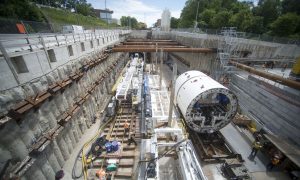Article by Simon Mwale
In part 1 of this series of articles, I discussed the critical position that CCARDESA has taken in addressing climate change in the SADC region. One question that was outstanding at the end of the article was what CCARDESA would be doing for the region and Zambia under the new project that was launched on 27-28 February 2020
The Comprehensive Africa Agriculture Development Programme Ex-Pillar 4 Project (CAADP-XP4) is a four-year project supported by the European Union through the International Fund for Agricultural Development. The project is implemented in different parts of Africa. In Southern Africa, CCARDESA has the responsibility of implementing this project whose overall objective is to enable agricultural research and extension services to contribute effectively to food and nutrition security; economic development and climate change mitigation.
The project has specific ‘Work packages’ through which outputs will be generated for the benefit of the actors within the commodity value chains. It is a development-oriented project with a strong emphasis on outputs that should directly influence long term change to the public and private sectors in the countries.
In addressing climate change impacts, there are two broad areas of thrust: mitigation and adaptation. Mitigation involves taking actions that will reduce the release of greenhouse gases into the atmosphere, thereby contributing to the slowing down and eventual reversal of the current trend in climate change. Adaptation involves taking actions that enable plants and animals to live as though the effects of climate change were not there. It’s similar to developing ‘resistance’ or ‘buffering capacity’ to climate change.
Through this project, CCARDESA will tackle both mitigation and adaptation. CCARDESA will promote the development, dissemination and adoption of technologies and agricultural management practices that confer adaptation or contribute to mitigation. Conservation agriculture, drought-resistant crop varieties, resistant animal breeds and soil water conservation techniques will be promoted as part of the Climate Smart Agricultural practices. Zambia has a lot to offer in such technologies and is well placed to be an active participant in improving the resilience of agricultural production through this project. Other countries in the region also have similar technologies available and will benefit from the actions of this project. It is envisaged that the promotion of technologies that can make the production systems resilient to climate change will contribute to the maintenance of stable yields under extreme weather conditions.
There is a wide range of data, innovations, statistics and trends directly related to Climate Smart Agricultural technologies at national, regional and global levels. The value of such data, scientific facts and statistics are enhanced when it is collated and made easily accessible to stakeholders who use it for different purposes. Dissemination of the data, statistics, knowledge products and other materials will be done under this project. The dissemination will be through the CCARDESA website and social media channels.
Of particular interest to CCARDESA will be the use of this information and knowledge product resources in the formulation or review of policies so that climate smart agriculture is embedded within the policies of the countries. In Zambia, organizations such as RENAPRI, Conservation Farming Unit, and the Ministry of Agriculture will be key in delivering on this aspect of the project.
The national partners of CCARDESA will also play a critical role in facilitating direct dialogue with the policymakers and make them appreciate the availability of evidence-based technologies and innovations for policy formulation and review. Implementation of policies and programmes that have climate smart agriculture principles embedded in them will lead to the resilience of our agricultural production systems.
Evidence-based policy formulation may sometimes be considered the soft part of using scientific research results. The other angle is the mainstreaming of the science of climate smart agriculture and its principles into national programmes. The CAADP XP4 project will support this process and provide technical backstopping for this to happen at country level. Currently, countries in the SADC region have the desire to undertake mainstreaming of climate smart agriculture into their national programmes. In this regard, CCARDESA will provide a valuable partner to the Ministry of Agriculture and the interested stakeholders to undertake this work.
For climate smart agriculture to be practiced widely and have tangible benefit to the Southern African region, there has to be capacity development to create critical mass of people with knowledge and skills. This is a continuous process targeting different agricultural value chain actors, including those that supply inputs to farmers. Under this project, CCARDESA will carry out a range of capacity development activities in conjunction with national partners.
Course materials will be designed and delivered to different categories of value chain actors. Part of this will be in the form of training of trainers so that the local personnel acquire adequate skills and knowledge for them to perpetually provide the training to others long after the project is closed. This is the preferred approach because CCARDESA believes in teaching others to fish rather than providing the fish. Clearly, the involvement of local institutions from the public and private sectors will be needed.
In the implementation of the CAADP XP4 project, there will be a special focus on the participation of the youth and women. The youth are a reservoir of untapped potential in the agricultural sector. They are a pool of energy, ideas and initiatives but they have limited room to express their ideas and unleash their potential. Through this project, CCARDESA will provide that opportunity to the youth.
Women are the cornerstone of agriculture in Southern Africa, but they are usually relegated to the periphery in a number of cases. In fulfilling its belief in gender equity and knowing that women are disadvantaged in agriculture, this project will encourage the participation of women and also ensure that all the technologies being promoted are gender-sensitive.
CCARDESA always works with partners at country level, in line with its principle of subsidiarity in project implementation. Therefore the delivery of the project and the benefits to Zambia and the other 6 countries where this project will be implemented, will rely on the participation of local organizations in the public and private sectors, as well as international organizations. Zambia is not short of such organizations.
The stage is set for action. Join us in promoting climate smart agriculture, climate-proofing of our agricultural value chains and improving the resilience of our agricultural production systems in order to attain food and nutrition security.
The author is the Acting Executive Director for CCARDESA Secretariat and former Lecturer in Crop Science at the University of Zambia, School of Agricultural Sciences.




















